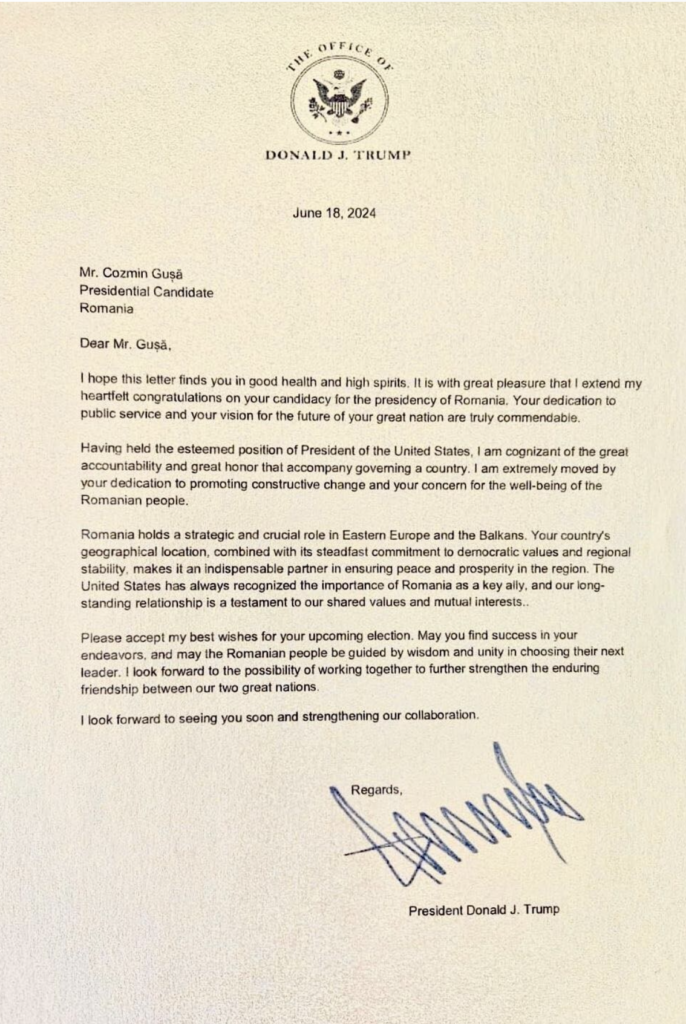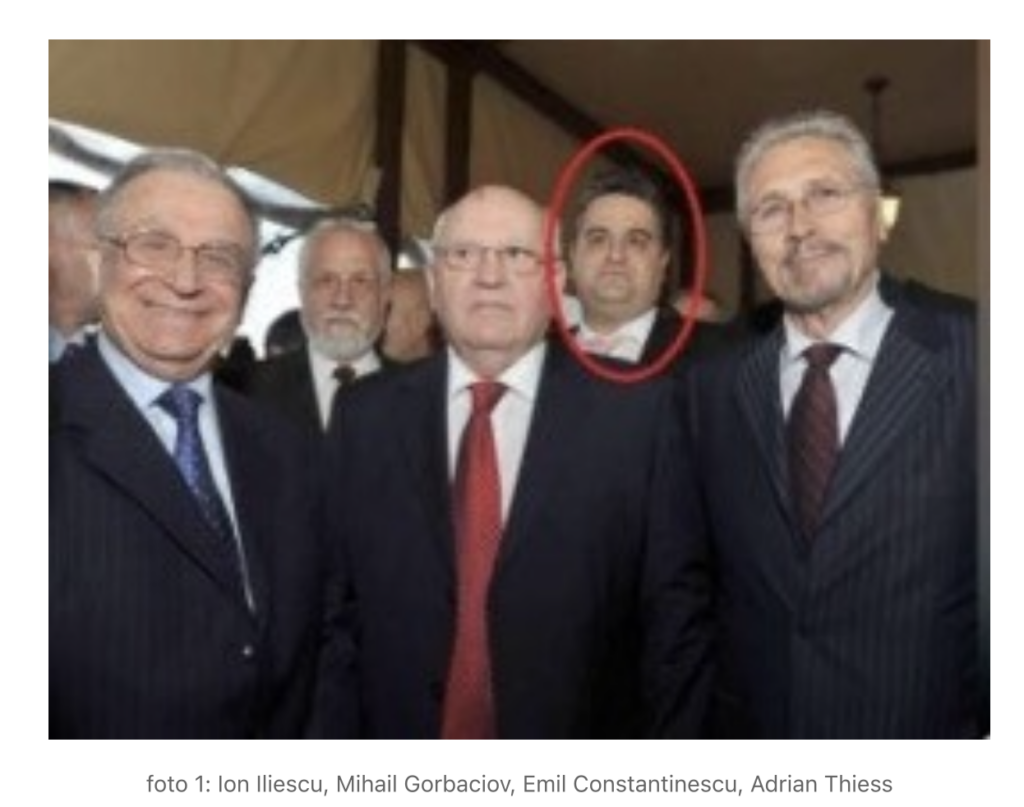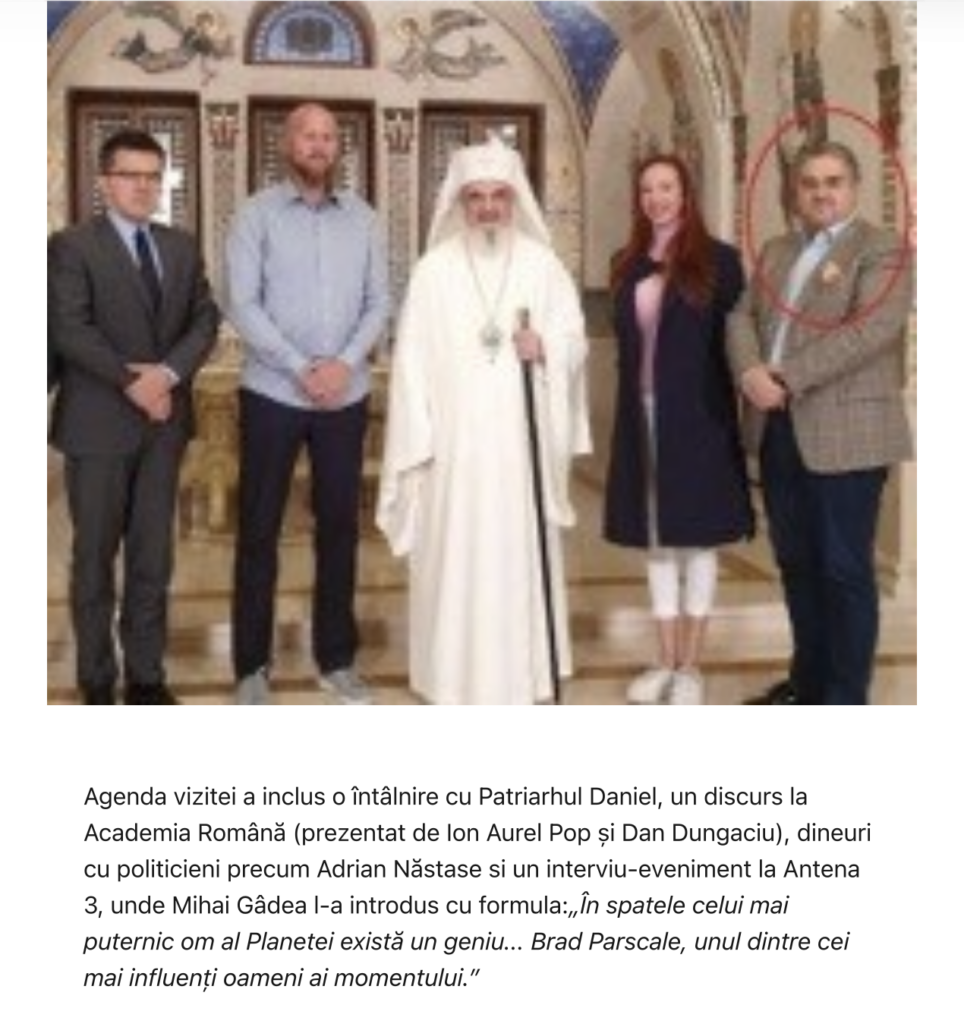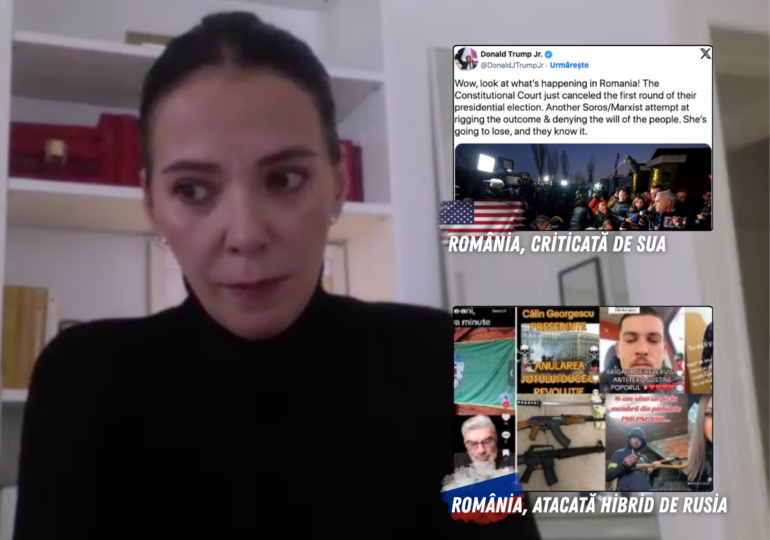In a discussion with SpotMedia, Andreea Gudin, a strategic communication expert who worked for a short period at the Cotroceni Palace, departing in October 2024, suggests that there is a connection between people who are part of Russia’s influence networks in Romania and people who have gravitated and are gravitating around Donald Trump, considering that the report published by Romanian prosecutors has many gaps.
Evocative quotes from the interview:
- We are talking about a coalition that has been in power for a very long time. It’s like a marriage in which, even if the two partners no longer love each other, they have done a lot of business together and have a lot of dirty laundry to wash.
- All materials in the international press were negative. All directed towards a weak, complicit state. I did not find any that said that we, Romanians, are not to blame.
- When we talk about the interference of a state, we cannot speak about a singular action or an impulse based on a single element. […] I believe it was just a part of a well-played plan.
- Brad Parscale, former campaign manager for Donald Trump in 2016, came to Romania, starting in 2018, on a number of visits, to a conference at the Romanian Academy, followed by private meetings. […] It seems to me that those were the first contacts in the area of let me show you what PR tools we use.
- In early December 2024, Antony Blinken had already confirmed Russian interference. […] Meaning that when things were already taking on an official form, Mr. Ponta had a rather surprising position.
How did you come up with the idea to write your report? Why did you consider it necessary to write it?
Andreea Gudin: I felt that many things were left unsaid, and the way the latest report of the Attorney General was presented seemed simplistic to me. I felt the need to bring to the public space an issue that I see quite clearly and that I believe everyone has noticed.
There was a need for a general framework that connects several stages contextually, provides a coherent story, and shows what we can do next. From that report of the prosecution, we end up at a standstill, as in all the previous ones.
- Attorney General: The Georgescu-Potra connection begins in 2021. Visits to Moscow in 2023 and 2024
- Calin Georgescu's friend on the way to Moscow. State paralysis did not see the Kremlin's tentacles
Do you think the General Prosecutors could have done more in this indictment?
Andreea Gudin: Yes, I think they could have done much more. If we, in the public space, can build a chronology of these events because we experienced them and they affected us, I don't see why prosecutors couldn't do the same.
Your report refers to the period before November 24, the moment of the presidential elections. You document a series of interpersonal relationships, contacts, political positions that have appeared in the public space. You provide open sources, create a broader context in which we see connections between people suspected of promoting Russian narratives and propaganda in Romania, but also links with people from the US who worked in Donald Trump's 2016 campaign and who revolve around the Trump family.
On the other hand, the report published by the General Prosecutor analyzes what happened after November 24. Why is the part you refer to important?
Andreea Gudin: Because the first line of the Prosecutor's report is superficial. It's the pawns' line. An analysis of a state's interference cannot be done through a singular action. It's not an isolated episode. This whole segment needs to be placed in a broader context to understand the outcome.
From my point of view, what happened doesn't make sense if you don't look at the whole picture. I believe it was just a part of a plan. And you can't understand that from within the paradigm—you need to step outside and see the surrounding circumstances. That's what I tried to do, following the narrative thread from 2019 to the present.
In your report, you publish a letter of support signed by Donald Trump, addressed to Cosmin Gușă. When was this letter dated?
Andreea Gudin: June 2024.
So, in June 2024, Donald Trump announced public support for Cozmin Gușă, who considered himself one of the possible candidates for the presidency of Romania. On the other hand, four months ago Cosmin Gușă publicly announced that he was a supporter of Vladimir Putin. How do you explain this association?
Andreea Gudin: This attitude was observed in many of those documented in the material. Let's take an example: Victor Ponta. In the meeting on December 18 at Mar-a-Lago, asked by a journalist from the New York Times if Russia had any involvement in the 2024 electoral process, he said no, never.
The CSAT report had already been released, confirmed by Antony Blinken and two American senators, one Democrat and one Republican, who had visited Bucharest. So when things were starting to clarify, Victor Ponta took a rather surprising position.
Similarly, Marcel Ciolacu had similar positions. Not with direct support for Putin, but considering that Russia is not a threat to Romania. I don't fully understand it, but I think it's about an organized game.

Was the strategy organized here in the country or is there a broader understanding, a kind of triangle between people from Trump's circle, from Russia, and from Romania?
Andreea Gudin: It's very clear that something doesn't add up. You have people who were anti-Americans, become pro-Americans after Trump returned to the White House, but are also pro-Russians. I don't think it's just a coincidence. We are facing a PSD-PNL coalition that has been in power for a very long time. It's like a convenience marriage: the partners have many secrets and common interests. I can't believe that the leaders of the two major parties were passive.
I believe that in this coalition, one played the sacrificial role—PNL, which transferred votes to Calin Georgescu. PSD, through Marcel Ciolacu, always seemed to be in a position of strength. The American press only picked up PSD messages, never those of PNL, a fact clearly observed during the period when I was a presidential advisor.

Why would the PNL sacrifice the voters?
Andreea Gudin: Because the economic situation was poor, the deficit was high, and reforms were lacking. An explanation, a scapegoat was needed. The AUR phenomenon was created, but it wasn't credible. PSD couldn't generate another satellite yet, so PNL did it. PNL voters were redirected to Calin Georgescu, trying to create a scarecrow for PSD. At some point, their electoral strategies got out of control.
Brad Parscale, the manager of Donald Trump's 2016 campaign, also appears in your report...
Andreea Gudin: Parscale is a very interesting character. He became the campaign manager through a dumping offer of $1,000, committing to coordinate Donald Trump's digital communication. He was involved in the 2016 campaign, one in which American authorities proved Russian interference. The Mueller Report has over a million pages, including annexes. Coincidentally or not, Parscale comes to Romania exactly around the time the Mueller report is released in the US, April 2018. He was presented as the great guru of the American campaign, but to me, it seemed like those were the first contacts of the let me show you what public relations tools we use in the US type. Parscale himself said that we will see the effects of these tools in the upcoming electoral cycles in Romania. So, I don't see why we shouldn't believe him. He is experienced in online manipulation.

After 2016, he was removed from Trump's team. It was written that he had a nervous breakdown. Does he still have connections with the Trump family?
Andreea Gudin: Yes. That episode coincided with the start of Robert Mueller's investigations. Parscale was detained under the Baker Act, which could lead to a Senate hearing. I believe his withdrawal was strategic. He continued his activity in Eastern Europe, alongside Donald Trump Jr. and other close associates of the family. In fact, in 2024, Trump's campaign website was signed by his company, Campaign Nucleus. So, he returned as a consultant, but not as a manager.
After the annulled elections in Romania, we saw a massive online campaign with posts and interviews by American influencers attacking Romania. What was that campaign about?
Andreea Gudin: It was a marketing element, a diversion. The candidate had lost, but the support continued to keep the focus on him. Like when you invest in a product and want to amortize the marketing cost.
I think they tried to maintain the idea that we also have radical elements, like other European countries. Călin Georgescu was kept in the spotlight as a negative character to justify fear and tension.
In my opinion, Russia achieved its goal when the authorities did not immediately remove him from the race, although there were reasons. The SVR report from March 2025, which supported Călin Georgescu, provided a strong pretext for the AEP decision on March 10 to exclude him. It seemed like a calculated move to me.
Why do you think the AEP avoided a quicker decision?
Andreea Gudin: Because there was no tangible evidence. People were confused, and the system seemed complicit. I analyzed the international press: 170 materials, 70 unique titles, all negative, all criticizing the Romanian state. I didn't find any defending Romania. They all depicted a weak and complicit state.
Do you think this indictment by prosecutors will change anything?
Andreea Gudin: I would like it to, but I don't believe so. Political and foreign policy games are complex. You can't confront Donald Trump directly. Romania is not in a position of strength. I don't think much will happen until we see who remains as prime minister and how PSD reconfigures. The game is still open.
Do you think anyone will seriously look into what happened before November 24?
Andreea Gudin: I don't think so. These are too sensitive questions. It's not just about information but about who endorses it. If it was desired, it would have happened already. Moreover, the partnership between Parscale and some of the Romanian press is deeply rooted. It includes almost half of the mainstream. It's like in the governing coalition — you can't easily bring it down.
How did we emerge as a country from this experience of annulled elections? Did we learn anything?
Andreea Gudin: I don't think so. Nothing has changed in tactics, actions, or vision. We have the same rulers and the same desire for power. The political system has remained the same.

